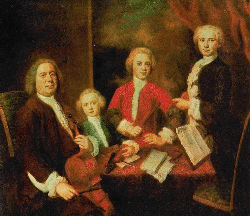
[ J.
S. Bach ] [ Arcangelo
Corelli ] [ Antonio Vivaldi ] [ Ole
Bull ]
Johann Sebastian Bach (1685-1750)
 In their own time, many of the great figures of Western civilization were
not so regarded. Labeled an idiot by his teachers, Albert Einstein was to become a pioneer
of modern physics, catapulting the world into the nuclear age. Bach was regarded by his
contemporaries as dull and old-fashioned, but today represents a pinnacle of Western
music--nothing before or since has been capable of surpassing, let alone replicating, the sheer genius of
his work.
In their own time, many of the great figures of Western civilization were
not so regarded. Labeled an idiot by his teachers, Albert Einstein was to become a pioneer
of modern physics, catapulting the world into the nuclear age. Bach was regarded by his
contemporaries as dull and old-fashioned, but today represents a pinnacle of Western
music--nothing before or since has been capable of surpassing, let alone replicating, the sheer genius of
his work.
The Bach family was well-established as a family of musicians in Thuringia, that section of
Saxony that Martin Luther, the great 16th century theologian, called home. Born at Eisenach
in 1685 to Johann Ambrosius Bach, Johann Sebastian's musical talent was evident from an early
age. He was orphaned at age 10 and subsequently took up residence with his older brother,
Johann Christoph, at Ohrdruf. An organist himself, Christoph gave the young Bach his first keyboard lessons;
some accounts maintain that the elder brother took little interest in the budding maestro's
ability and treated him rather severely. Still, Johann Sebastian managed to obtain scores from
his brother's library, copying them furiously by moonlight--an activity that possibly contributed
to his poor eyesight later in life.
Leaving Ohrdruf in 1700, Bach set out for Luneburg, where he enrolled in the parish Lyceum and
participated in the choir of Michaeliskirche. It was here that Bach's virtuosity at the organ was
first apparent. After a brief stint as a violinist at Weimar in 1703, Bach served as organist in Arnstadt
and came into conflict with local officials due to his obstinacy and refusal to comply with the requests
of the parish school.
During his stay in Muhlhausen, Bach married his second cousin, Maria Barbara. It was here that his first cantatas
were written, and one was even published. More disagreements with church authorities and
municipal officials regarding his duties arose, although he later reconciled and became friends with his
one-time adversaries. Still, he was ambitious and on the move, not satisfied with his duties at Muhlhausen. Returning to
Weimar in 1708, it was here that Bach rose to fame as an organist and teacher, writing some of the finest cantatas and
keyboard music of his career. For Bach, this was a formative period in which he first encountered the works of
Vivaldi, making numerous transcriptions and editions in his own name. A conflict of interest between his employer and
a friend forced him to leave the city that for nearly a decade fostered his success and made him a local
celebrity.
In December 1717, Bach accepted the position of Kapellmeister at Cothen. Most of Bach's best-known works were written here, including
the Brandenburg Concerti and the solo violin sonatas. It was during a stay
at the spa in Carlsbad that tragedy struck in the midst of one of the happiest periods of Bach's life. His wife took
ill and died, leaving her husband with four young children. Bach remarried and moved to Leipzig, where he was to spend
the remainder of his life. Once again, his music took a spiritual turn, and there is markedly less instrumental
music surviving from this period. Whatever the reason for this change, we know that the tide of popular opinion was
increasingly turning against him, and by the time of his death in 1750, he had long been considered a relic that time simply
forgot.
While still a figure in musical circles, Bach was celebrated not for his abilities as a composer but rather as a teacher
and organist. It took Mendelssohn some 100 years later to reacquaint the world with this pillar of the musical world.
-Mark Moya (Sept, 2000)